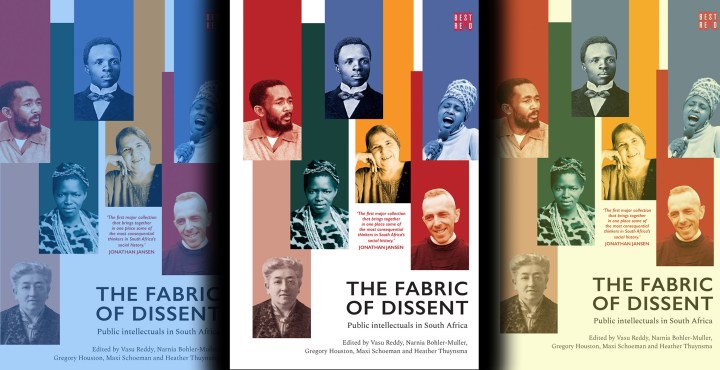OP-ED
Public intellectuals and the fabric of dissent

Who or what are public intellectuals and how are they created? What is the role of the public intellectual in social, cultural, political and academic contexts? The Fabric of Dissent: Public Intellectuals in South Africa profiles 75 South Africans who were able to rise beyond narrow formulations of identity into a larger sense of what it means to be human.
The “public intellectual” has a specific role in society – to publicly raise embarrassing questions, to confront orthodoxy and dogma, to be someone who cannot be co-opted by governments, someone whose raison d’être is to represent people and issues that are routinely forgotten or swept under the rug.
This definition of the public intellectual – from Palestinian cultural critic and literary scholar Edward Said – is the foundation of a book we have just completed, titled The Fabric of Dissent: Public Intellectuals in South Africa, published by the Human Sciences Research Council (HSRC) Press.
Our editorial team from the University of Pretoria’s faculty of humanities and the HSRC put together 75 portraits of public intellectuals who personify Said’s definition and who have profoundly influenced South African society in the past and present.
As the portraits reveal, public intellectuals are not only found in our universities and places of learning; they are located in all our communities and are dedicated to the service of social justice. Their work, perspectives, knowledge, influence, writing, art or music inspire us towards change: they challenge the world to recognise a variety of meanings, recalibrating our often parochial mindset.
We need to be unsettled by a variety of meanings and differences of opinion in order to strive for true freedom. From this standpoint we can navigate through the debates, thoughts, behaviours, disagreements, emotions and feelings – all of which fit into the equation of speaking truth to power.
The Fabric of Dissent is about offering counter-perspectives to those which conceal facts and truths. The fabric of society weaves together all our customs, beliefs, practices, malpractices, truths and untruths. Dissent, in this case, is transformative because it forces us to develop new ways of looking at and engaging with our emerging world.
This book is important now because we are in a moment where intellectual activity is at risk of being subsumed by populism, nationalism, fascism, fake news and social media.
The book values public intellectual activity and celebrates the role it has played in South Africa. We feature people who challenge convention and risk their everything in the process. They confront the undemocratic, inhumane behaviour that goes counter to truth, equality, kindness and dignity.
Fabric of Dissent is divided into four parts, each reflecting a different context of public intellectuals, notably political public intellectuals, cultural public intellectuals, academic public intellectuals and organic public intellectuals.
Some of the voices profiled are well known, including Nelson Mandela, Es’kia Mphahlele, John Kani, Olive Schreiner, Miriam Makeba, Eugène Marais and Trevor Noah; others are perhaps less recognisable but their import is nevertheless significant.
One of the latter is political public intellectual Dora Tamana, a 20th-century grassroots activist who had an innate understanding of social and gender issues. She was an inspirational leader, a poet, and an advocate for tolerance and equity long before the words gained the significance they now hold.
She was born in 1901 and grew up in a rural village in Transkei and had to end her schooling in Standard 4 to take care of her family. In 1939 she moved to Blaauwvlei on the Cape Flats where she built a shack and became involved with the Cape Flats Distress Association, or Cafda, an organisation dedicated to improving the living conditions of shack dwellers. She became a leader in the ANC Women’s League and played a prominent role in the anti-pass movement in 1953 and was actively involved in women’s protests deep into the 1980s.
Tamana chaired the opening session of the 1981 launch of the United Women’s Organisation, which drew together young and old women of all race groups, and read out her poem titled, We Have Opened the Way for You – a call for women of South Africa to unite and act together for change. She died two years later.
You who have no work, Speak.
You who have no homes, Speak.
You who have no schools, Speak.
You who have to run like chickens from the vulture, Speak.
Let us share our problems so that we can solve them together.
We must free ourselves.
Men and Women must share housework.
Men and Women must work together in the home and out in the world.
There are no crèches and nursery schools for our children.
There are no homes for the aged.
There is no one to care for the sick.
Women must unite to fight for these rights.
I opened the road for you,
You must go forward.
An altogether different example of one of our profiles in the Organic Public Intellectuals section, is satirist and cartoonist Jonathan Shapiro, aka Zapiro, who embodies the commitment to freedom of expression and justice and stands firm against censorship and political intimidation. His iconic Lady Justice cartoon depicted Jacob Zuma preparing to rape Lady Justice, but he released it with some trepidation.
This is an excerpt from the book:
“I made a very conscious decision there that I’m going to go for broke… But the weird thing was when I came up with that idea for that cartoon… I wrote down: ‘What the hell is Zuma doing? Zuma is raping justice.’ And then the right brain just exploded, because I suddenly realised justice is a woman. Metaphorically it’s Lady Justice… I started the first little rough of that image… then I got cold feet.
“I got cold feet – not because of Zuma or the politicians or the repercussions, but I suddenly thought how would women see that cartoon? A gang rape situation, or potential gang rape and so I then showed my wife, and she was also absolutely shocked… But she understood what I was trying to do, but we decided that the best thing would be to send it round to some female journalist colleagues… Ja, and we sent it to a couple of them and they all told me that it knocked the breath out of them and then they looked at it for a minute, and they said: ‘But it’s right.’”
Each of the 75 people featured in the book, have, in their own unique way, dedicated their minds and lives to showing up wrong; fighting for freedom and nudging our democratic project along to create a better world. It is because of these people that South Africa has a rich legacy of ideas and concepts of humanity.
They have left deep imprints and through their thoughts they have changed our society for the better, whether it is about how we treat one another, how we manage the great challenges of our time or showing us how music and art can help us navigate ideas that can change the world. DM
Professor Vasu Reddy is Dean of the Faculty of Humanities at the University of Pretoria.
The Fabric of Dissent: Public Intellectuals in South Africa is edited by Vasu Reddy, Narnia Bohler-Muller, Gregory Houston, Maxi Schoeman and Heather Thuynsma, and is published by HSRC Press.




















 Become an Insider
Become an Insider
Courageous and tenacious. So many good people in our beautiful land.